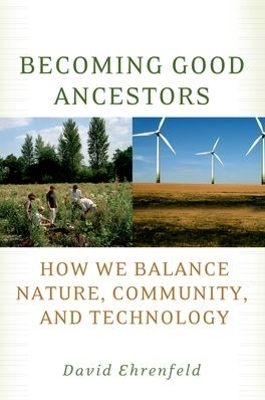
Becoming Good Ancestors
Oxford University Press Inc (Verlag)
978-0-19-537378-3 (ISBN)
The book focuses on our present-day retreat from reality, our alienation from nature, our unthinking acceptance of new technology and rejection of the old, the loss of our ability to discriminate between events we can control and those we cannot, the denial of non-economic values, and the decline of local communities. If we are aware of what we are losing and why we are losing it, the author notes, all of these patterns are reversible. Through down-to-earth examples, ranging from a family canoe trip in the wilderness to the novels of Jane Austen to Chinese turtle and tiger farms, Ehrenfeld shows how we can use what we learn to move ourselves and our society towards a more stable, less frantic, and far more satisfying life, a life in which we are no longer compelled to damage ourselves and our environment, in which our children have a future, and in which fewer species are endangered and more rivers run clean. In the final chapter, he offers a dramatic view of the possibilities inherent in a fusion of the best elements of conservatism and liberalism.
Our society has an inherent sense of what is right, says Ehrenfeld, and the creativity and persistence to make good things happen. It is now time to apply our intelligence, guided by our moral judgment, to the very large problems we all face. This book is an important first step.
David Ehrenfeld is Professor of Biology at Rutgers University and holds degrees in history, medicine, and zoology. He is the founding editor of the journal Conservation Biology and the author of The Arrogance of Humanism and Beginning Again.
Preface ; Bookmap ; Part 1. In Search of Honesty ; 1. Pretending ; 2. Brainstorming Has Its Limits ; 3. Nothing Simple ; 4. The Comforts of Fantasy ; Part 2. Keeping Track of Our Losses ; 5. Rejecting Gifts ; 6. The Uses and Risks of Adaptation ; 7. When Machines Replace People ; 8. Pseudocommunities ; 9. Obsolescence ; 10. Accelerating Social Evolution ; 11. Writing ; Part 3. Towards a Sustainable Economics ; 12. Affluence and Austerity ; 13. Energy and Friendly Fire ; 14. Durable Goods ; 15. Preserving Our Capital ; 16. Conservation for Profit ; 17. Hot Spots and the Globalization of Conservation ; 18. Putting a Value on Nature ; 19. The Downside of Corporate Immortality ; Part 4. Relating to Nature in a Human-Dominated World ; 20. Wilderness as Teacher ; 21. As Opposing View of Nature ; 22. Death of a Plastic Palm ; 23. Scientific Discoveries and Nature's Mysteries ; 24. I Reinvent Agriculture ; 25. Thinking about Breeds and Species ; 26. Strangers in Our Own Land ; 27. Teaching Field Ecology ; 28. The Ubiquitous Right-of-Way ; 29. A Walk in the Woods ; 30. Old Growth ; 31. Intimacy with Nature ; Part 5. Restoring the Community ; 32. The Utopia Fallacy ; 33. Traditions ; 34. Jane Austen and the World of the Community ; 35. Universities, Schools, and Communities ; 36. What Do We Owe Our Children? ; 37. Epilogue: A Call for Fusion and Regeneration ; Notes ; Index
| Erscheint lt. Verlag | 6.11.2008 |
|---|---|
| Verlagsort | New York |
| Sprache | englisch |
| Maße | 155 x 235 mm |
| Gewicht | 509 g |
| Themenwelt | Naturwissenschaften ► Biologie ► Ökologie / Naturschutz |
| ISBN-10 | 0-19-537378-2 / 0195373782 |
| ISBN-13 | 978-0-19-537378-3 / 9780195373783 |
| Zustand | Neuware |
| Haben Sie eine Frage zum Produkt? |
aus dem Bereich


